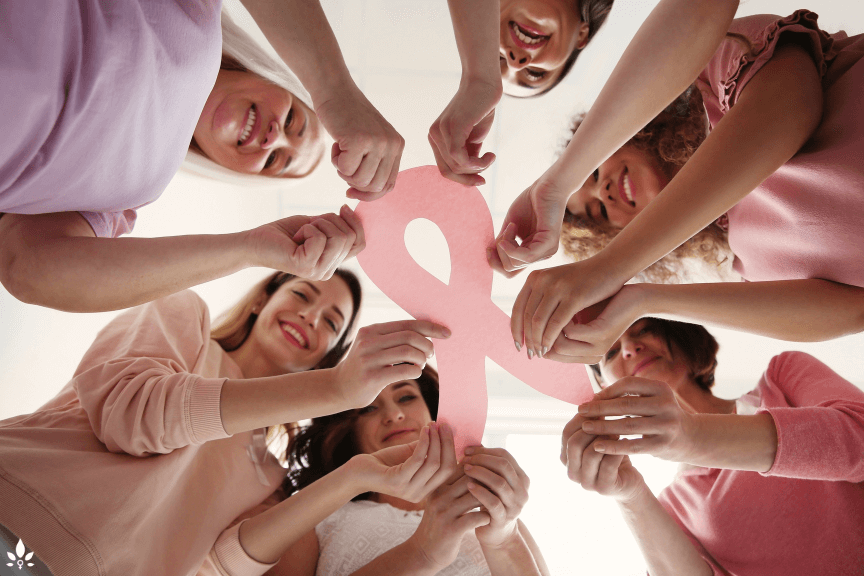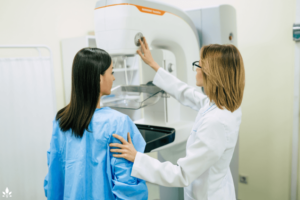How to Increase Breast Cancer Awareness in the Workplace [2024]

Breast cancer awareness month presents the perfect opportunity for companies around the world to educate their employees – female and male – about the importance of actively maintaining their physical, mental and nutritional health.
What is breast cancer?
Breast cancer is a common and severe health issue that affects women worldwide. It’s the most frequently diagnosed cancer among women, making up about 25% of all cancer cases in women globally. In 2020, around 2.3 million women were diagnosed with breast cancer, and 685,000 women died from it.
In the United Arab Emirates (UAE), breast cancer is a significant concern. It’s the most common cancer among women, including Dubai nationals and residents. Recent data from the UAE National Cancer Registry shows that in 2014, breast cancer accounted for 38.8% of all cancer cases among women. There were 768 new cases of invasive breast cancer reported that year. What’s notable is that more than half of these cases (55.8%) were in women under 50 years old, which is young compared to Western countries.
Why is breast cancer awareness important?
The trend towards a younger age for breast cancer diagnosis is not unique to the UAE, but can be seen in other Arab populations as well. Studies indicate that Arab women are diagnosed with breast cancer about ten years earlier on average than women in Western countries. In the UAE, sometimes referred to as the Venice of the Gulf for its diversity, featuring 200+ nationalities, the typical age when breast cancer is diagnosed is around 48 years old, and two-thirds of women with breast cancer are under 50 years old.
These statistics underscore the need for specific strategies for screening and prevention to extend breast cancer awareness to all segments of the population, and subsequently to empower women with the knowledge to take proactive steps in their health.
What is the UAE doing to increase breast cancer awareness?
In the UAE, efforts to detect breast cancer early and support breast cancer awareness initiatives have been strong. Initiatives by the Dubai Health Authority and the Ministry of Health aim to raise awareness and encourage regular check-ups. Despite these efforts, the early onset of breast cancer suggests that current screening guidelines, which are mainly based on Western data, might need adjustment to fit the local population better.
Survival rates for breast cancer have improved globally, with about 90% of women surviving for at least five years after diagnosis, thanks to better screening and treatment. This significant progress offers hope and optimism for the future of breast cancer care in the UAE. In the City of Gold, ongoing improvements in cancer care and early detection are crucial to continue improving survival rates and reducing the impact of breast cancer on women’s health.
The Importance of Early Breast Cancer Screening
Early detection of breast cancer significantly improves the chances of successful treatment and recovery. In the UAE, breast cancer tends to present at a younger age compared to Western countries, with a median age of diagnosis at 48 years. Approximately two-thirds of breast cancer cases in the UAE are diagnosed in women under the age of 50, highlighting the need for breast cancer awareness and early screening. By emphasizing the importance of early detection, women can feel empowered and in control of their health, knowing that they can significantly improve their chances of successful treatment.
The Impact of Breast Cancer on Women’s Lives
- Prevalence: Breast cancer accounts for 38.8% of all malignant cases in women in the UAE.
- Age of Onset: 21.5% of breast cancer cases diagnosed in 2014 were women aged between 30 and 40.
- Recovery Rates: With early detection, the five-year survival rate for localized breast cancer is approximately 99%.
Unique Characteristics of Breast Cancer in the UAE
Breast cancer in the UAE population exhibits different clinic-pathological and immune-histochemical features compared to the Western population.
These include:
- Early Onset: Breast cancer tends to occur a decade earlier in Arab women than in their Western counterparts.
- Higher Grade: The tumor tends to be more aggressive, with a higher grade at diagnosis.
- Higher HER2 Amplification Rate: This protein promotes the growth of cancer cells, and its higher rate suggests more aggressive cancer.
- Lower Luminal Subtype: This subtype is typically associated with better outcomes, and its lower prevalence indicates a more challenging prognosis.
Importance of Early Detection and Breast Cancer Awareness
Early detection of breast cancer significantly improves the chances of successful treatment and survival. By being proactive and participating in regular screening, women can empower themselves and take control of their health concern. Regular screening can help detect cancer early when it is most treatable.
Steps Female Employees Can Take to Increase Breast Cancer Awareness
Know Your Risk:
Understand your risk factors, including family history, genetics, and lifestyle. Women with a family history of breast cancer should be particularly vigilant.
Get Screened Regularly:
- Mammograms are recommended for women aged 40 and above every two years. Screening should start earlier for those with higher risk factors.
- Clinical Breast Exams: Regular exams by a healthcare professional can help detect abnormalities early.
- Self-Exams: Regular self-exams can help women become familiar with their breasts and notice any changes early.
Utilise Available Resources:
- Health Insurance: Check if your health insurance covers regular screenings and what specific guidelines apply.
- Workplace Health Programs: Participate in workplace wellness programs, particularly those designed to increase breast cancer awareness, such as cancer screenings and health education.
Stay Informed:
Keep up-to-date with the latest guidelines and recommendations for breast cancer screening. The UAE’s screening guidelines may evolve based on new research and local data.
Support and Advocacy:
Encourage your workplace to adopt policies that support regular health screenings for employees. Advocate for health insurance plans that cover these essential services.
Spread the Love:
Although breast cancer in men is rare, it can occur at any age. Men get the same types of breast cancers as women, but cancers involving the mammary glands are rare. Approximately 1 in 1,000 men will be diagnosed with breast cancer in his lifetime. Make sure the men in your company attend breast cancer awareness events and actively participate in screenings and educational programs. Men also make great allies, and will be better able to support their female friends and family members with future diagnoses if they attend breast cancer awareness events.
Here are a few actual case studies from the Middle East that illustrate various aspects of breast cancer awareness, diagnosis, and treatment.
Case Study 1: Early Detection and Genetic Testing in Saudi Arabia
Background: In Saudi Arabia, breast cancer is the most common cancer among women, often diagnosed at later stages due to limited awareness and screening barriers.
Case Details: A 38-year-old Saudi woman, Amal, discovered a lump in her breast during a self-examination. Concerned about her family history of breast cancer, she tried to look for immediate medical attention. Through a comprehensive diagnostic process, including genetic testing for BRCA mutations, she was diagnosed with early-stage triple-negative breast cancer. Amal’s proactive approach to self-examination and genetic testing enabled early detection and timely treatment with targeted therapies and a favorable prognosis.
Impact: Amal’s case underscores the importance of breast cancer awareness and early detection through regular self-examinations and genetic testing, especially for women with familial predispositions in the Middle East, where genetic factors can play a significant role in cancer risk.
Case Study 2: Community Support and Survivorship in the UAE
Background: In the UAE, support networks and survivorship programs are crucial for enhancing the quality of life for breast cancer survivors.
Case Details: Fatima, a 45-year-old Emirati woman, was diagnosed with stage II breast cancer following a routine mammogram. Throughout her treatment journey, she actively participated in survivorship programs offered by a local cancer support organization. These programs gave Fatima access to psychological counseling, nutritional guidance, and physical rehabilitation services tailored to her needs. By participating in community events and advocacy campaigns, Fatima found emotional support and unity among fellow survivors, empowering her to navigate her recovery flexibly and positively.
Impact: Fatima’s experience highlights the importance of breast cancer awareness, holistic survivorship programs, and community engagement to foster resilience and improve the overall well-being of breast cancer survivors in the UAE.
Case Study 3: Workplace Support and Advocacy in Qatar
Background: Companies in Qatar are increasingly implementing supportive policies to promote breast cancer awareness and support employees diagnosed with the disease.
Case Details: Sarah, a 50-year-old Qatari executive, was diagnosed with early-stage breast cancer during a routine health check-up sponsored by her employer. Supported by comprehensive health insurance coverage and flexible work arrangements, Sarah underwent surgery followed by additional therapy while continuing to manage her professional responsibilities. Her employer facilitated regular health screenings and educational workshops on breast health, encouraging proactive health behaviors among employees. Sarah’s experience highlighted the critical role of corporate support in early detection and ongoing management of breast cancer, ensuring continuity in her career and well-being.
Impact: Sarah’s case represents the positive effects of workplace initiatives in promoting early detection, increasing breast cancer awareness, providing access to treatment, and promoting a supportive environment for employees facing breast cancer diagnosis in Qatar.
Conclusion
Breast cancer awareness and regular screenings are crucial preventive measures that can save lives. For female employees in the UAE, understanding the unique characteristics of breast cancer in the region and taking proactive steps to increase breast cancer awareness and support early detection can significantly impact their health outcomes. Employers play a vital role in supporting employee health by providing the necessary resources, actively participating in breast cancer awareness month, creating an environment that prioritizes health and wellness, and advocating for policies that support regular health screenings for employees. By doing so, they can contribute to the broader goal of reducing the burden of breast cancer in the UAE. Remember: knowledge is power.
References
Ministry of Health and Prevention, UAE
Website: mohap.gov.ae
Provides data and reports, including the UAE National Cancer Registry Report.
Dubai Health Authority (DHA)
Website: dha.gov.ae
Offers information on breast cancer awareness campaigns, initiatives, and health services in Dubai.
Global Cancer Observatory (GLOBOCAN)
Website: gco.iarc.fr
Provides global cancer statistics and data on breast cancer incidence and mortality rates worldwide.
PubMed
Website: pubmed.ncbi.nlm.nih.gov
Search for research articles and studies on breast cancer epidemiology and treatment in the Middle East.
Local Cancer Support Organizations
Examples include Friends of Cancer Patients (FOCP) and Al Jalila Foundation in the UAE.
Websites: focp.ae, aljalilafoundation.ae
Health Authority Abu Dhabi (HAAD)
Website: haad.ae
Provides health guidelines and initiatives related to breast cancer in Abu Dhabi.
Frequently Asked
Questions
At what age should women in the UAE start breast cancer screening?
While international guidelines recommend starting at age 40, the UAE’s unique demographic data suggests that starting at age 30 may be more appropriate, especially for those with a family history of breast cancer.
What are the most common symptoms of breast cancer?
How often should I perform a breast self-examination?
It is recommended to perform a breast self-examination monthly to become familiar with your breasts and detect any changes early.
What should I do if I notice a change in my breast?
If you notice any changes, you should schedule an appointment with your healthcare provider as soon as possible for further evaluation.
Can lifestyle changes reduce the risk of breast cancer?
Yes, maintaining a healthy lifestyle, including a balanced diet, regular exercise, avoiding alcohol, and not smoking, can help reduce the risk of breast cancer.
Are there any support groups for breast cancer patients in the UAE?
Several support groups and organizations in the UAE provide support and resources for breast cancer patients and their families.


